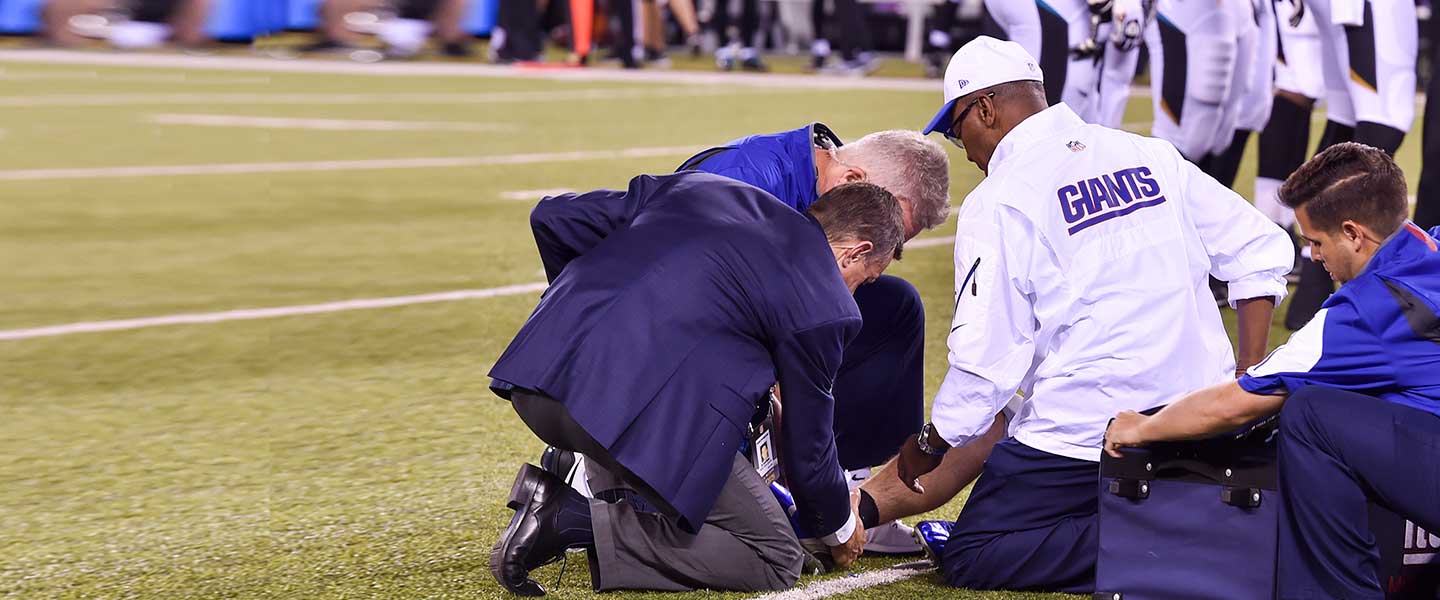(Dr. Scott Rodeo is the Head Team Physician for the New York Giants)
The most important testing at the NFL Scouting Combine this week may actually take place two miles away from Lucas Oil Stadium in Indianapolis. Before the draft prospects step onto the field for the 40-yard dash, they’ll undergo an extensive medical evaluation at Methodist Hospital.
The medical exams at the Combine are a major piece of the evaluation process.
“I think it’s an important factor,” said Dr. Scott Rodeo from the Hospital for Special Surgery, who has been the Giants’ head team physician since 2015. “We have a meeting with the general manager, head coach, player personnel people and scouts prior to the draft where we review the medical history on each player. They take that into account, obviously. So, it’s an important piece of information.”
All 336 Combine participants will undergo a thorough medical examination as part of the intensive four-day draft evaluation. Players are broken up by positions, with running backs, offensive linemen and kickers set to undergo their medical exams on Wednesday.
There are two components to the medical exams: Internal and orthopedic. The Giants will send one doctor for the internal exam, which involves blood work, an EKG and other tests on organs. Rodeo, who specializes in shoulder, elbow, knee and ankle injuries, will be joined by one other Giants orthopedist.
The orthopedic exams include X-rays, MRIs and CT scans. And there’s no substitute for the hands-on evaluation that takes place.
“You want to examine a shoulder or knee or ankle for joint stability, motion, strength,” Rodeo said. “There are things that you can detect on a careful examination so it’s important to evaluate these players. If he has any history of anything, you want to get your hands on that player because if I’m going to sign off on it for my team, I want to know that I’ve carefully examined this player.”
Prospects cycle through rooms in the hospital to meet with all 32 teams. There are four teams in a room and an orthopedist from each team will evaluate each player. The Giants work with the medical staffs from the Panthers, Saints and Packers every year.
“We’ll talk to the player briefly and then examine him,” Rodeo said. “Each doctor wants to get his hands on the player. If he’s really had no history of anything substantial then maybe one person examines him and says, ‘He’s fine.’ ”
Players fill out their medical histories the night before the exams, but the doctors also do their homework to gather information on the prospects.
“As you can imagine, it’s sort of a job interview so, frankly, the player is not incentivized to tell you about his injuries,” Rodeo said. “But we get the information. It’s kind of out there, largely. But that’s why you do need to carefully examine the player. If there’s any concerns based on your examination, we can go get imaging studies as needed. It’s a comprehensive dive.”
Some players with red flags, such as those recovering from postseason surgery, will return to Indianapolis in April for a medical re-check. The Giants also can re-examine prospects during pre-draft visits with up to 30 players.
“If there’s some concern raised with the Combine exam for an injury, we may bring the kid into the team in the weeks after the Combine and prior to the draft to look at him again more carefully and do some other things,” Rodeo said. “Maybe have them see a different specialist for a spine or something like that.”
Rodeo said the Giants’ medical staff gives each prospect a grade that is shared with the front office and coaching staff before the draft.
“There are a couple of guys that fail if they’ve had a substantial injury and there’s a high risk,” Rodeo said. “We try to grade each player based on objective criteria, share that with the team and then ultimately it’s stratifying risk.”
How much the injury concerns are considered will be decided by general manager Dave Gettleman.
“It’s one piece of the puzzle that they look at as far as preparing for the draft,” Rodeo said. “You’ve got your medical part and obviously the scouts have all the performance part they’ve compiled over the previous year from the college career.”
By Dan Duggan for NJ.com
Source
